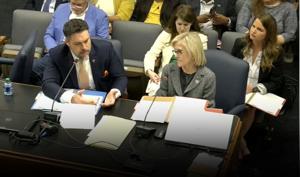Mississippi News
The history behind IHL’s tenure policies for Mississippi faculty
What does ‘contumacious’ mean? The history behind IHL’s ‘vague’ tenure policies
Last month, the Institutions of Higher Learning Board of Trustees shocked faculty across Mississippi when it voted, without discussion, to modify criteria in some of its tenure.
Faculty, who had no formal input on the changes, say the revised criteria are vague and could be easily used by presidents to target outspoken or marginalized colleagues in Mississippi, particularly considering that IHL used similar language to oust liberal professors during the civil rights movement.
As a job protection, tenure ensures that faculty can’t be fired without just cause. IHL’s policy changes create new criteria that university presidents can use to decide whether to award tenure at the end of the six-year, rigorous review process, including a faculty member’s “collegiality,” “effectiveness, accuracy and integrity in communications,” and “contumacious conduct,” a factor that was previously only included in the board’s dismissal policy.
“It’s not clear what these terms mean in practice,” said Brian LaPierre, the outgoing president of University of Southern Mississippi’s faculty senate. “They’ll have to be defined.”
The Merriam-Webster Dictionary says contumacious means “stubbornly disobedient” or “rebellious.” The IHL has included the word in employment contracts for years as a reason a faculty member could be dismissed. But how does IHL define the term?
In an email, spokesperson Caron Blanton wrote the board does not define contumacious conduct in its policies, but that “it is based on the standard definition of the word and aligns with language in tenured and tenure-track contracts.”
As a reason to dismiss a faculty member, contumacious conduct is a somewhat rare standard in higher education. In a 2005 survey, the American Association of University Professors found that the term was included in the dismissal policies of just two colleges.
The term has a long history in Mississippi. Ever since the Legislature created the IHL in 1943, the board has had “the power and authority to terminate any such contract at any time for malfeasance, inefficiency or contumacious conduct, but never for political reasons.”
‘The time has come to fumigate some of our college staffs’
In late 1963, a year after James Meredith enrolled at University of Mississippi, James Silver was in North Carolina to give a speech on what he called the state’s “closed society.” Silver, a white man born in New York, had taught at UM for 22 years. In that time, he earned a reputation as “a threat to the status quo” in Mississippi due to his support for minimum wage laws, criticism of the Confederacy, and a false suspicion that he was Jewish.
In North Carolina, Silver delivered an acerbic address, telling the audience that white supremacy was so calcified in Mississippi, it had created “a climate where non-conformity is forbidden, where the white man is not free, where he does not dare to express a deviating opinion without looking over his shoulder.”
Almost immediately, segregationist politicians condemned Silver’s talk and called on the IHL board to fire him. A few days later, John Bell Williams, a U.S. representative, told the Mississippi L.P. Gas Dealers Association that “the time has come to fumigate some of our college staffs and get those who will teach Americanism and not foreign ideologies.”
The IHL board was limited in how it could respond to these calls. Just two years earlier, UM had denied tenure to William Murphy, a law professor who was a member of the American Civil Liberties Union. The law school almost lost its accreditation, and following the backlash, the board created its first state-wide tenure policies. If IHL fired Silver, it would be risking accreditation all over again.
Nonetheless, five months later, wire reports announced the board believed it had found a way to fire Silver that “would not be taken on political grounds.” The board undertook an investigation, hiring private detectives to follow Silver and ultimately landed on 15 reasons to fire Silver for “contumacious conduct.”
The reasons were primarily statements Silver made in his address about the riot at UM when a segregationist mob erupted in violence and killed two people after Meredith enrolled. The board also asked Silver to account for his activities on the night of the riot, and to provide a list of his “endeavors in recruiting new doctoral candidates, students and faculty members.”
It seemed the charges were set to go through, until the board abandoned them just a few months later in 1964 by allowing Silver to take a leave of absence to teach at University of Notre Dame.
Faculty at other universities in Mississippi weren’t as lucky. That same year, Alcorn State University’s president fired two faculty members, Paul and Bessie Taylor, for contumacious conduct. The Taylors believed they were targeted because they were members of the American Association of University Professors, an advocacy organization, historian Joy Ann Williamson-Lott wrote in her book “Jim Crow Campus.”
The AAUP complained, but the Taylors never got their jobs back, because the board backed the president.
“In other words, the board cared enough about the status and reputation of the state’s white flagship public institution to appease accreditation boards,” Wiliamson-Lott wrote, but that same concern did not extend to faculty at the Black colleges.
‘What defines collegially? Is it me being nice to you?’
The new policies also remind many faculty of a more recent firing at UM. In late 2020, the university suddenly terminated Garrett Felber, a tenure-track professor in the history department, because he did not sufficiently communicate with his chair, Inside Higher Ed reported. Provost Noel Wilkin told the outlet the decision to not renew Felber’s contract was based on “multiple instances where Dr. Felber refused to speak” with his chair, which “made it impossible to maintain a productive working relationship.”
Felber, who settled with the university last year, has said he never refused to talk with his chair. He maintains he was targeted for criticizing administrative decisions and because he organized for prison abolition. Felber noted that just a few months before he was fired, his chair had praised his research and service to the campus.
Tenure is traditionally awarded based on three criteria: Teaching, research and service to the university. These standards are usually elaborated on in handbooks that universities create with input from faculty. For instance, a handbook might define a faculty member’s “service” to the university as participating in the faculty senate or advising a student organization.
Some Mississippi universities address collegiality in their handbooks but do not require it as a criteria for tenure. At University of Southern Mississippi, candidates for tenure are evaluated on their collegiality but only in the context of the three traditional areas.
Jackson State University appears to be the only school that considers “professional collegiality” as a specific criteria for awarding tenure. Jackson State defines collegiality in forms faculty use to apply for tenure by listing a number of criteria, such as showing up to class on time and participating in university functions like convocation.
Still, some faculty say even those standards are slippery.
“What defines collegially? Is it me being nice to you? Is it me being collaborative across departments? It’s the most vague of all of the areas of which you are examined,” said Robert Luckett, a tenured history professor and the director of Jackson State University’s Margaret Walker Center. “I don’t think that anyone has taken it seriously as something that impacts your actual promotion and tenure.”
The AAUP has never approved of “collegiality” as a reason to fire or not grant tenure to a faculty member, because of the possibility for abuse, said Greg Scholtz, the director of the organization’s academic freedom department.
The organization often advises faculty who are negotiating with their universities on language in handbooks or contracts. Scholtz said that in cases where universities have insisted on including “collegiality” as a criteria for tenure, the AAUP asks that the factor be evaluated the way USM does: In conjunction with a candidate’s teaching, research or service, not on its own.
Last week, PEN America and FIRE, nonprofits that advocate for free speech in higher education, sent a joint letter that called on the IHL to roll back the policy changes. It’s unlikely the board will do that, which means universities will need to incorporate these policies into handbooks in the fall.
KB Melear, a University of Mississippi professor who specializes in employment law, said it could take a lawsuit for faculty to get better definitions of the new criteria.
Though if a faculty member did sue over the new “collegiality” criteria, it’s likely the university would win the case. A 2010 law review article co-authored by Mary Ann Connell, the former general counsel for UM, found that the courts sided with the university “almost every time” a faculty member claimed collegiality was used to discriminate against them.
“The way that collegiality has been viewed by the courts, it’s been more toward your work environment and productivity and relationships,” Melear said. “I would think it would be quite easy to litigate that, and I think probably that might happen.”
This article first appeared on Mississippi Today and is republished here under a Creative Commons license.
Mississippi News
Events happening this weekend in Mississippi: April 25-27
SUMMARY: This weekend in Mississippi (April 25-27) features a variety of events across Central and Pine Belt regions. Highlights include MiraGotSoul at Vibe Studio in Jackson, a community Dinner and Movie in Clinton, and the Natchez Kite Festival. Enjoy live performances with Sweet Lizzy Project in Natchez and the New Bourbon Street Jazz Band in Clinton. Family-friendly activities include the Native Plant Fest and Community Farmers Market in Jackson. In Hattiesburg, catch the Henry Cho tour and the Downtown Crawfish Jam Music Festival. Overall, it’s a weekend full of entertainment, culture, and fun activities for all ages.
The post Events happening this weekend in Mississippi: April 25-27 appeared first on www.wjtv.com
Mississippi News
Events happening this weekend in Mississippi: April 18-20
SUMMARY: This weekend (April 18-20), Mississippi offers a variety of events for all ages. In Jackson, enjoy Food Truck Friday, a jazz concert, free outdoor movie screenings, and multiple exhibitions including “Of Salt and Spirit” and “Hurricane Katrina: Mississippi Remembers.” For family fun, there’s an Easter Egg Hunt at the Ag Museum and “Bunnies & Butterflies” at MCM. Natchez features the Spring Pilgrimage, Lafayette’s 200th anniversary celebration, and a farmers market. In the Pine Belt, highlights include Live at Five, a Spring Candle-Making Workshop, and Easter events at the Hattiesburg Zoo. Don’t miss the Bluff City Block Party and more!
The post Events happening this weekend in Mississippi: April 18-20 appeared first on www.wjtv.com
Mississippi News
Events happening this weekend in Mississippi: April 11-13
SUMMARY: This weekend in Mississippi (April 11-13), enjoy a variety of events across the state. Highlights include the Eudora Welty Birthday Bash in Jackson, Trivia Night at the Mississippi Museum of Natural Science, and Boots & Bling Fundraiser in Natchez. For family fun, check out the Bunny Bonanza in Jackson or the Easter Egg Hunt in Clinton. The Natchez Concours d’Elegance Car Show and Stranger Than Fiction Film Festival offer cultural experiences, while the 12th Annual Dragon Boat Regatta in Ridgeland and the Hub City Classic Car Show in Hattiesburg provide exciting activities for all ages.
The post Events happening this weekend in Mississippi: April 11-13 appeared first on www.wjtv.com
-

 News from the South - Missouri News Feed3 days ago
News from the South - Missouri News Feed3 days agoMissouri lawmakers on the cusp of legalizing housing discrimination
-

 Mississippi Today2 days ago
Mississippi Today2 days agoDerrick Simmons: Monday’s Confederate Memorial Day recognition is awful for Mississippians
-

 Mississippi Today5 days ago
Mississippi Today5 days agoStruggling water, sewer systems impose ‘astronomic’ rate hikes
-

 News from the South - West Virginia News Feed5 days ago
News from the South - West Virginia News Feed5 days agoIs West Virginia — and the rest of the country — prepared to care for our seniors?
-

 Mississippi Today5 days ago
Mississippi Today5 days agoParents, providers urge use of unspent TANF for child care
-

 News from the South - Arkansas News Feed7 days ago
News from the South - Arkansas News Feed7 days agoOp-Ed: Another dismal year for ranked-choice voting | Opinion
-

 News from the South - Florida News Feed4 days ago
News from the South - Florida News Feed4 days agoFlorida woman accused of setting fires during burn ban
-

 News from the South - Louisiana News Feed5 days ago
News from the South - Louisiana News Feed5 days agoTaxes on vapes and smokeless tobacco advance through committee | Louisiana



















































